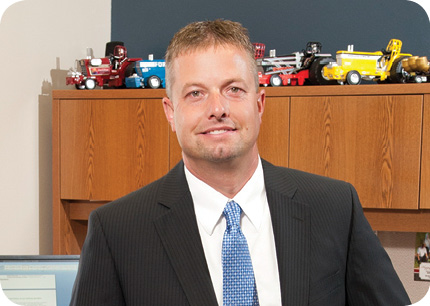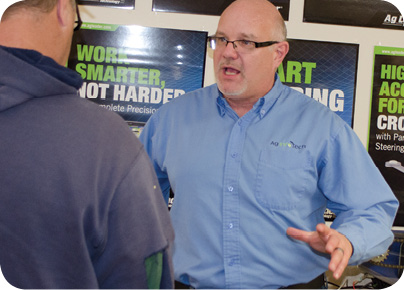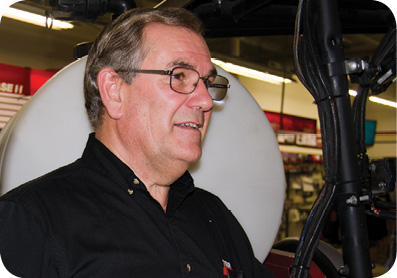ABOVE: Precision Farming Dealer assembled members of its advisory board for an in-depth and candid dinner conversation covering a variety of topics including precision growth opportunities, competitive pressures and the value of partnerships. From left are Mike Lessiter, publisher of Precision Farming Dealer, Dave Nelson, owner of Brokaw Supply Co., Ken Diller, precision farming network manager with Hoober Inc., Brent Wiesenburger, the precision ag manager at South Dakota Wheat Growers, Jack Zemlicka, managing editor of Precision Farming Dealer; and Tim Norris, CEO of Ag Info Tech.
Precision farming is a unique segment of the agricultural industry with a diversity of strategies for success. But there’s also a collaborative bond that connects stakeholders in building profitable businesses out of selling, servicing and supporting technology.
To take the pulse of trailblazing precision dealers on a variety of topical challenges and outlooks for the future of ag technology, Lessiter Media President Mike Lessiter and I sat down for a structured, yet at times spontaneous dinner conversation in Indianapolis, Ind., with members of the Precision Farming Dealer editorial advisory board.
Joining us at the table were a diverse group of 4 influential retailers, all of which have been recognized by Precision Farming Dealer’s annual Most Valuable Dealership program. The dinner discussion included Tim Norris, CEO of Ag Info Tech, an independent precision farming dealership in Mount Vernon, Ohio; Brent Wiesenburger, the precision ag manager at South Dakota Wheat Growers, a 5,400 member co-op based in Aberdeen, S.D.; Ken Diller, the precision farming network manager at Hoober Inc., a 9 store Case IH dealership group; and Dave Nelson, owner of Brokaw Supply Co., a shortline dealership based in Fort Dodge, Iowa, and part of the Ag Solutions Group.
A select excerpt of a much broader conversation that occurred among the dealers and the Precision Farming Dealer staff is shared below, highlighting some of the more engaging and candid responses to questions during the evening.
PFD: Certainly the current ag economy is having an impact on everyone’s dealership. But beyond that, what are you anticipating to be the greatest challenge or concern facing your precision business in the coming year?
Brent Wiesenburger: “Looking at the big space for precision agriculture with Wheat Growers, it’s ‘How in the world am I going to compete with the big companies in the big data game?’ The margin in our precision data services, the MZB Precision Farming System side of our business, is going to erode. The large companies have largely scalable platforms, which we do as well, but they’ve got a bunch of money backing it.
“So for me to keep up in that space, I need to be thinking about collaboration and APIs (application program interfaces), to where I can secure the MZB platform, not only within Wheat Growers, but our existing customers to ensure that it’s going to survive and it can coexist with those other companies.”
Ken Diller: “I see collaboration as the only way that we’re going to be able to stay relevant. On the data side of the business, there’s no reason to think we should be able to do it better than our customer’s crop consultant or crop advisor, but there’s still a space that we can fill. Knowing how to fill that and being able to also work with all the different private, independent people that work around us is going to be a challenge. Not only do we have to work with them, we sell them pieces of equipment as well.

“It’s all about what your X factor is. Your X factor is only good until your neighbor starts doing it, too. But you should be onto your second or third X factor when your competitor is figuring out your first one…” — Dave Nelson
“So there’s a fine line to be drawn there. We’ve got to figure out how we can do that so that it benefits not only our customers, but us and the fertilizer company, or whoever the applicator is.”
Tim Norris: “On the data side, I think there’s going to be a lot of companies — and there already are a lot of companies — that we can’t compete with. But we’re the innovators, the ones on the far side of that bell curve. And there’s not going to be any black box program that I think is really going to do what our customers want.
“There’s still that potential with boots on the ground and local agronomy to have a niche in the data area for growers. Will we grow and be as huge of a player on the data side that some of the others are? No. There’s no way. A dealership our size can’t compete with them. But I think we still can work with some of the growers. There’s going to be a lot of precision dealers who decide to get out of this area or find an opportunity to collaborate with them to keep them from going out. There’s going to be an opportunity to pick up some of the market share and even hire some of their employees or have them coming in with us.”
Dave Nelson: “When we got into precision agriculture, we almost got too big, too fast. So we’re focusing our scope with that part of our business, but we’re not in the data piece at all. This is because 60% of our customer base are large retailers and co-ops trying to do it themselves. We’re not going to go sell them a toolbar and then drive down the road and try to manage their customer’s data.

“Regulations are going to drive business, especially on the soil sampling side, to the point that the structure that’s there today can’t handle it. This could definitely be a positive for our business, and really positive for the grower because if they do this the right way, they’ll decrease input costs…” — Tim Norris
“We’re on the hardware side, but it’s concerning a little bit, as more OEMs include technology on equipment. When the controller and everything is ISO in the arm rests and all that, through one of the major manufacturers, it’s going to be harder just to compete for those precision hardware sales. But on the flipside, being a shortline dealer, we don’t answer to one color or brand. We can be colorblind and serve our customers no matter what they want. So we need to find our space in that. The more we can stay niche and specialize and do the planter starter fertilizer kits and in-furrow injection stuff, I think we’ll be OK.”
PFD: Most of you are operating in areas where government regulations are already or likely will affect your customers. How is that regulatory element going to impact your precision business?
Diller: “NRCS regulations are going to drive some opportunities for us in the future. We’ve already started the process by putting flow meters on equipment in the northern acres of our service area. We’ve been pushing this hard for custom manure haulers for 2 years now and we’re finally really gaining some traction with it. So those guys are finally beginning to understand that we’re going to come to a point where if they can’t document how many gallons they apply, they’re not getting a license.”
Nelson: “For us in Iowa, it’s coming. We’ve got three counties that were sued by the Des Moines Waterworks, and something’s got to come out of it. It may not be because of the lawsuit, but there’s going to be action taken. That’s why the more we carve out that niche of the marketplace with fertilizer application equipment and technology, the better for us.

“I see collaboration as the only way we’re going to be able to stay relevant. On the data side of the business, there’s no reason why we think we should be able to do it better than our customer’s crop consultant or crop advisor, but there’s still a space that we can fill. Knowing how to fill that and be able to also work with all the different private, independent people that work around us is going to be a challenge…” — Ken Diller
We’re not finding that the OEM dealers or the fertilizer equipment dealer in Iowa to be very innovative or ahead of the curve on that stuff. That’s where we’re viewed as being innovators, to your point.
Norris: “I think the regulations are going to drive business, especially on the soil sampling side, to the point that the structure that’s there today can’t handle it. This could definitely be a positive for our business, and really positive for the grower because if they do this the right way, they’ll decrease input costs. I think it’s extremely important and it’s why we’ve invested in extra people to service this part of our business even though we’re in a downturn right now.”
PFD: Sometimes a downturn can present the best opportunity for calculated expansion and each of you seem to have a good radar when it comes to the precision industry. How do you see the competitive landscape changing for your dealership in the next few years?
Wiesenburger: “The thing that keeps me up at night is our competitors and whether they are going to develop a better widget or a better software application that’s going to trump what we’re doing. But with the right team members on staff, and our ability to prioritize the next project, I think we’ll keep ahead of the competition. We have agronomic focused users that are constantly challenging us with their next real need and I feel that is important — delivering tools that truly add value at the farm level — and are items that can make a positive impact to our producer’s bottom line.
“With one of our main projects, we’re going to be bringing our as-applied information wirelessly back from the cabs of all of our application machinery. We’re going to have a 10 grower panel and explain to them what they’re looking at on this map. Next fall, we’re planning to offer that to every customer who does business with Wheat Growers. What that will do is solidify the trust in their local co-op, if we’re giving them the information back.

“The thing that keeps me up at night is our competitors and whether they are going to develop a better widget or a better software application that’s going to trump what we’re doing. But with the right team members on staff, and the ability to prioritize the next project, I think we’ll keep ahead of the competition…” — Brent Wiesenburger
“The accountability is going to be there. But I also suggested to our leadership team that it would be useful to do a customer survey and figure out what our trust level is with our customer base and then do it again in 2 years, when we’re serving all this information back to them. It’s about staying one step ahead.”
Diller: “There are leaders and followers in this industry. You soon find that out. If you’re the guy that’s out front, leading everybody else, sooner or later, others are going to pick up on what you’re doing. There will be some iteration of what you’ve done and the competition will be trying to adopt it. But the trouble is, they’ll be 3-4 years late.”
Nelson: “It’s all about what your X factor is. I gave a presentation one time, asking dealers ‘What’s your X factor?’ Your X factor is only good until your neighbor starts doing it, too. But you should be onto your second or third X factor when your competitor is figuring out your first one.”
Norris: “Our competition is always forcing us to be better. It used to be we had very little competition from the local equipment dealers. But they’re trying to step it up. They’re getting better, but it seems like they’re still several steps behind. If we slack off though, that gap’s going to close. We’re not as threatened by another independent precision dealer because I think we can stay ahead of a bunch of them. It’s probably the equipment dealership that concerns us the most because they can sell technology with the sale of the tractor or combine right with that piece of machinery.
“We’ve got to make sure that we guard ourselves and we stay on that second and third thing, to keep us out ahead. That’s what my challenge is and it’s one of the reasons that I separated myself from the day-to-day stuff of the business — to try to figure out that next step. But I really do think it’s going to be harder and harder to stay ahead, especially when we start seeing these big companies getting into the data side and throwing millions upon billions of dollars into it. How do you stay ahead of that?
“So we’re going to have to find our areas where we can stay ahead and really focus on those instead of trying to catch up to the big guys, because that’s a race I don’t think we can win.”







